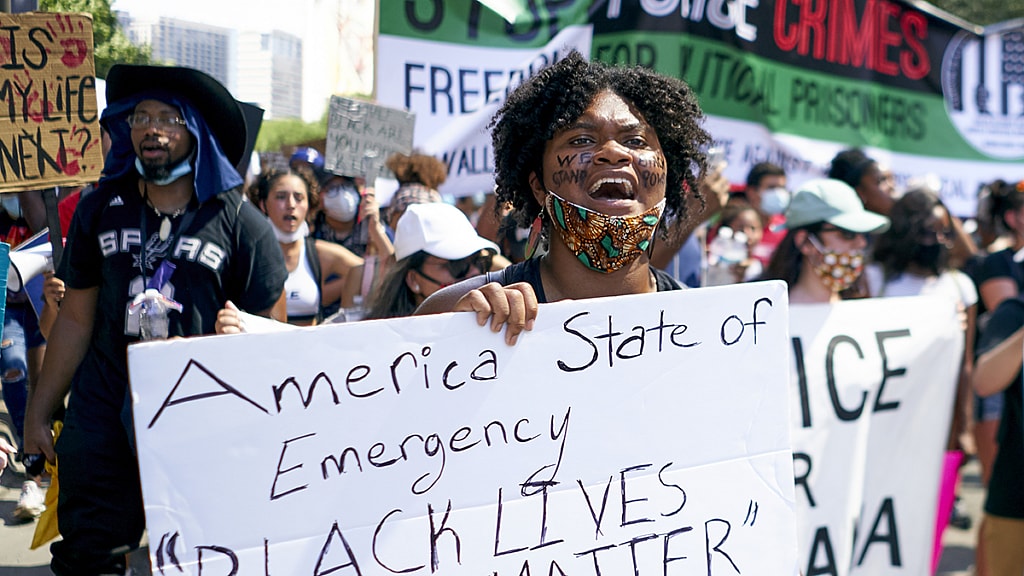The good news is that Juneteenth is a federal holiday. The bad news is that Black people still need that freedom, which a June 19 celebration fails to provide. And while we should not trivialize the symbolism of a federal Juneteenth holiday, it is no substitute for federal legislation that would help make Black people truly free.
In what can only be described as an unexpected move in 2021, on the tail end of a historic pandemic, President Joe Biden signed the law making Juneteenth a national holiday. The legislation passed the Senate unanimously, with all but 14 Republican white men in Congress approving of the new holiday.
And while Texan lawmakers Rep. Sheila Jackson Lee, a Democrat, and Sen. John Cornyn, a Republican, made the Juneteenth holiday possible in a rare show of bipartisanship, it is worth noting that Texas Gov. Greg Abbott just signed a law banning the teaching of critical race theory. Texas is also one of the numerous white nationalist-led states pushing bills to suppress voting rights for Black people and cement white minority rule for generations.

In other words, they will give us Juneteenth, and hope we are not looking as they ban any curriculum that teaches Americans about the history of Juneteenth, and pass laws — 389 bills in 48 states — stripping Black Americans of their citizenship rights.
Juneteenth, which began in Texas, is our Independence Day. Because on July 4, 1776, Black people remained in a state of enslavement. Juneteenth is a day of celebration and a day of commemoration, a day to remember the ancestors and lost family members, a time to build ourselves up, reclaim our history and center ourselves and our experiences.
Further, Juneteenth is a reminder that freedom has always been a precarious proposition for Black folks in America, filled with conditions and dashed hopes, shifting goalposts, backsliding and lots of bloodshed. And justice has always been delayed if not denied. When President Abraham Lincoln enacted his Emancipation Proclamation on New Year’s Day in 1863, that did not impact the millions who were enslaved by the Confederacy. Even when the Civil War ended in April 1865 after secessionist General Robert E. Lee surrendered to the Union Army, Black people were enslaved for another two months. It was not until June 19 when Union Major-General Gordon Granger traveled to Galveston and notified the enslaved they were free.
The Thirteenth, Fourteenth and Fifteenth Amendments and the Reconstruction-era civil rights laws also freed Black people, until Jim Crow wiped them away. So, too, did the Civil Rights and Voting Rights Acts a century later. Now, white supremacist lawmakers hope to enact a Jim Crow 2.0 and erase all Black progress.
The moral of the story is that none of us are free, until we are all free. Whether back in 1865 or in 2021, when America tells Black people they have been emancipated, one must read the fine print.

Today, the police murder of George Floyd and countless other Black souls, and the attack on the U.S. Capitol have forced the nation to focus on systemic racism in policing and the criminal justice system, the body politic, our institutions, and everywhere in American society.
Although Black people were supposedly emancipated, and have lived in this country for over 400 years, we still live in a hostile environment. The remnants of slavery are in our laws, policies, practices, procedures and customs. Racism is systemic and institutional, not merely a few bad apples or a small group of people doing harmful things. This is not simply a matter of a few neo-Nazis or Proud Boys burning Black churches, but an issue of power and white privilege, and the microaggressions Black people face in schools, in the workplace and daily life.
The U.S. has not come to terms with its legacy of racism and white supremacy, including a history of slavery and how it denies Black people of their humanity, dignity and equality.
Now is a perfect time to honor Juneteenth, and we need this. However, honoring Juneteenth means making the promise of freedom real. A holiday is not the end, but rather the beginning of our journey to true liberation. Black people will not be free until Congress passes crucial legislation, including the For the People Act, which would restore voting rights and bring about electoral reform; the George Floyd Justice in Policing Act of 2021, which would remedy racial abuse in law enforcement; the John Lewis Voting Rights Advancement Act, which would restore the protections of the Voting Rights Act of 1965 gutted by the Supreme Court, and especially H.R. 40, which would establish a commission to study reparations for slavery.
Anything less than this would be pure symbolism and empty slogans at this point.

Follow David A. Love on Twitter at @davidalove.
Have you subscribed to theGrio’s “Dear Culture” podcast? Download our newest episodes now!
TheGrio is now on Apple TV, Amazon Fire and Roku. Download theGrio.com today!


